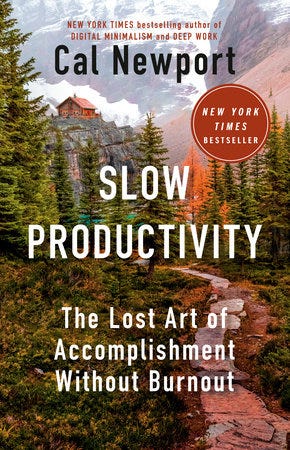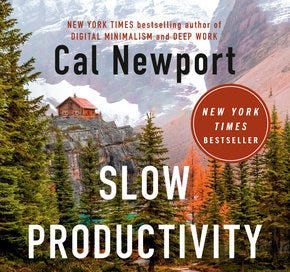Embracing a slower path to success and satisfaction
The value of cultivating meaningful work in a world obsessed with speed.
Book Review: Slow Productivity: The Lost Art of Accomplishment Without Burnout
By Cal Newport
Grade: 96

In the thought-provoking book Slow Productivity: The Lost Art of Accomplishment Without Burnout, author Cal Newport—a Georgetown University computer scientist—challenges the modern workplace's relentless focus on efficiency and what he calls its “rapid task completion norms.” In its place, he proposes that true productivity for knowledge workers hinges not on frenetic activity but on deep, sustained contemplation. That is, he argues for a reevaluation of our work habits in pursuit of more fulfilling and effective outcomes.
(Eds. Note: Newport is one of a handful of writers and researchers whose work I read religiously. In fact, his book Deep Work led me to totally rearrange my work schedule.)
What is Slow Productivity and why is it important?
Slow Productivity refers to a philosophy and approach to work that prioritizes deep, focused, and high-quality output over the rapid, frenetic task completion that often characterizes modern professional environments. Newport, one of the foremost productivity and proficiency advocates, suggests a more deliberate and measured approach to tasks, advising that true productivity should not be measured by how quickly tasks are accomplished but by the quality and impact of the work produced.
The concept of Slow Productivity emphasizes several key principles:
Reduce the number of tasks: By focusing on fewer tasks at a time, individuals can give more attention and care to each, leading to better outcomes.
Prioritize quality over quantity: Newport argues that a shift in focus from the number of tasks completed to the quality of work encourages more meaningful and more satisfying work.
Work according to your natural rhythms: He suggests that aligning your work with personal and natural rhythms—such as working intensively when most energized and taking breaks when needed—leads to more sustainable productivity and prevents burnout.
Imagine a workplace where the measure of success is not the volume of tasks completed, he writes, but the depth and quality of the work produced. Newport forcefully argues that the current culture of constant busyness not only undermines our ability to perform meaningful work but also leads to burnout. Drawing on historical examples and current research, he makes a compelling case for slowing down and focusing more deeply.
Slow Productivity distills three main lessons for achieving meaningful work without burnout:
Do fewer things: Newport encourages people to adopt a minimalist approach to productivity by focusing on fewer tasks at any given time. Rather than spreading oneself thin across a myriad of responsibilities, this principle advocates for a disciplined prioritization of tasks that truly matter. By concentrating on select projects, you can devote more time, energy, and creativity to achieve quality results. This approach helps eliminate the illusion that busyness equals productivity and instead fosters a deeper engagement with the chosen tasks.
Embrace quality over quantity: Modern work culture often rewards quantity—more tasks completed, more emails sent, more hours logged. However, Newport argues that genuine productivity arises from quality rather than quantity. When we focus on quality, we value the craftsmanship of each project. This can involve embracing deeper thinking, creative exploration, or intricate problem-solving that requires significant mental bandwidth. He encourages knowledge workers to create a work culture that rewards thoughtful, impactful work, understanding that even if fewer things are produced, their quality will have a lasting impact.
Work at a natural pace: Newport recommends aligning productivity with natural work cycles and rhythms rather than fighting against them. He points out that creative breakthroughs often require downtime and that rushing through work can lead to suboptimal results. By honoring our individual cycles—times of peak creativity versus times of rest—workers can achieve a sustainable pace that prevents burnout. This involves giving yourself permission to take breaks, engage in leisure activities, and allow ideas to marinate rather than forcefully extracting them under artificial deadlines.
Together, these principles underpin Newport’s vision of Slow Productivity, where thoughtful prioritization, high-quality output, and sustainable work habits blend to create a fulfilling, efficient way of working. Ultimately, he hopes to shift the modern mindset away from a frenzy of superficial accomplishments toward a steady pursuit of meaningful contributions.
Relevant example
An apt example from the book is that of singer-songwriter Jewel, who was discovered while performing in a coffee shop, Though homeless at the time, she would soon sign a lucrative record deal with Atlantic Records. However, she turned down the million-dollar advance so she could continue touring without the pressure of having to recoup the initial expense from the label.
This allowed her to focus on honing her craft and produce what she felt was her best work. Her “Hardwood grows slowly” philosophy worked, as her debut album, Pieces of You, which got off to a slow start, eventually sold over 12 million copies.
Why I loved the book
Newport's arguments are grounded in relatable anecdotes and rigorous research, which makes Slow Productivity both accessible and persuasive. The stories of figures like Marie Curie and Lin-Manuel Miranda illustrate the universal relevance of deep work. Furthermore, his critique of the shift towards shallow work resonates with anyone feeling the crunch of modern work expectations. Additionally, his insights into how cultural and psychological factors influence our work behaviors provide a fresh perspective on productivity.
Who is the book for?
This book is an essential read for anyone looking to escape the cycle of burnout and find satisfaction in their professional lives. It’ll challenge you to redefine what it means to be productive in a world that increasingly values speed over substance.




This speaks to me in a slightly different form where I am being slow and selective in choosing the companies I want to work with and then working diligently to map out a plan that is successful for them and enjoyable work for us both along the way. Choosing partners that have the same chemical makeup as me and value insight and creative expertise and hands-on knowledge of their products as opposed to going after any 30 clients that will say yes simultaneously, doing hurried spotty work for all of them and it being a low yield for both of us in the long run!